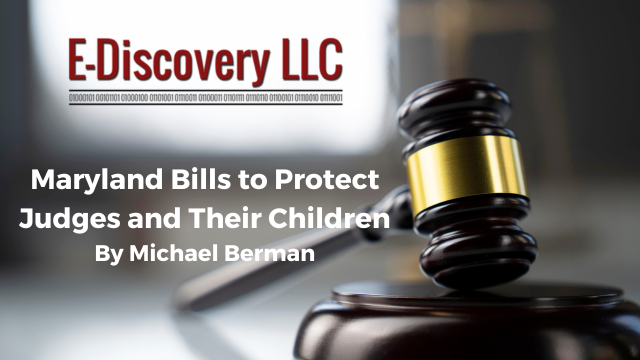
The Hon. Paul W. Grimm (ret.) has written about the organized Bar’s duty to support the judiciary from unwarranted attacks. OpEd: Legal Profession Must ‘Speak Out’ Against Unfair Attacks (duke.edu)(Oct. 24, 2023).
I have echoed Judge Grimm’s message.
- I Hear Crickets From the American Bar Association About Threats Against Colorado Justices – E-Discovery LLC (ediscoveryllc.com)(Jan. 7, 2024);
- Judge Paul Grimm: The Judiciary is Under Attack. Lawyers Need to Defend It – E-Discovery LLC (ediscoveryllc.com)(Oct. 24, 2023); and,
- Threats Against the Colorado Supreme Court Must Be Called Out – E-Discovery LLC (ediscoveryllc.com)(Dec. 23, 2023).
The Maryland General Assembly is considering a bill to increase the protection of Judges’ children. Jack Hogan, MD politics: Lawmakers consider letting judges’ children attend neighboring schools (thedailyrecord.com)(Feb. 21, 2024). Mr. Hogan reported:
State lawmakers are considering whether to allow judges to send their children to public schools outside the jurisdiction in which they live.
Proponents say the measure would both protect children from harm and maintain the judicial system’s integrity by limiting opportunities for intimidation….
The proposed policy would allow Maryland’s roughly 320 judges, including from the state’s Supreme Court, Appellate Court, District Court and Circuit Court to — free of any fees — send their children to a public school in a county adjacent to the one in which they live.
It’s likely that just a fraction of the state’s judges have school-aged children who might take advantage of the proposed policy.
Jack Hogan, MD politics: Lawmakers consider letting judges’ children attend neighboring schools (thedailyrecord.com)(Feb. 21, 2024).
The Bill’s sponsor, Delegate C. T. Wilson, said: “This is something that several of my friends in the judiciary asked me to just bring up because they’re fearful for the lives of their children. Especially those who do juvenile cases….” Id.
The Bill is HB 930. The Fiscal Note states: “This bill requires a local superintendent of schools, on request, to allow a child to attend a public school in an adjacent county other than the county where the child is domiciled with the child’s parent, if the child’s parent is a judge of the Supreme Court of Maryland, Appellate Court of Maryland, District Court of Maryland, or circuit court. A local superintendent may not charge a fee for allowing such a child to attend a public school in the adjacent county.”1
HB 664, is titled “Court Personnel – Protection of Personal Information.” It is named the “Judge Andrew F. Wilkinson Judicial Security Act.” Judge Wilkinson was murdered. The Fiscal Note describes the Bill. The Daily Record reported that the father of the Bill’s sponsor, Sen. Paul Corderman, was a judge. In 1989, a pipe bomb exploded in the Judge’s apartment. Id. “The new law would also extend to the spouse, children and dependents of a protected judge.” Id.
Michael Berman.
In another bill, “[l]awmakers are seeking to authorize judges, their families and other protected individuals to request that their personal information not be published. They can also request to have it removed from an online site or network and file suit if their request isn’t fulfilled…. Those who knowingly post personal information that results in harm to a judge or their family would likely face criminal penalties.” Jack Hogan, MD lawmakers advance judges’ privacy standards, citing 2023 slaying (thedailyrecord.com) (Feb. 5, 2024).
HB 664, is titled “Court Personnel – Protection of Personal Information.” It is named the “Judge Andrew F. Wilkinson Judicial Security Act.” Judge Wilkinson was murdered. The Fiscal Note describes the Bill. The Daily Record reported that the father of the Bill’s sponsor, Sen. Paul Corderman, was a judge. In 1989, a pipe bomb exploded in the Judge’s apartment. Id. “The new law would also extend to the spouse, children and dependents of a protected judge.” Id.
Maryland Supreme Court Chief Justice Matthew J. Fader said that: “In Baltimore, more than one in three active judges park in public areas and walk by themselves to and from the courthouse, passing people who will be — or were — before them in court.” Id.”
The Chief Justice also announced creation of a Security Task Force “that will review safety efforts at courthouses across the state following the fatal shooting of Washington County Circuit Judge Andrew Wilkinson in October.” Madeleine O’Neill, MD chief justice announces Security Task Force following judge’s killing (thedailyrecord.com) (Dec. 7, 2023).
Members of the task force have been asked to carry out a list of objectives, including identifying best practices in courthouse security. That can range from screening at courthouse entry points, assessing safety issues in courtrooms and public areas, and probing mail and packages that are sent to judges…. The Security Task Force will also specifically examine safety for judges entering and exiting courthouses, including going to and from their vehicles, and for judges who do not have access to secured corridors at their courthouses, both of which have been key concerns for judicial officers.
Madeleine O’Neill, MD chief justice announces Security Task Force following judge’s killing (thedailyrecord.com) (Dec. 7, 2023).
The Maryland State Bar Association has advocated for increased judicial security. MSBA President Advocates for Increased Security for Judges and Attorneys, Bill Quickly Moves to Full Senate | Maryland State Bar Association – MSBA(Feb. 5, 2024). “[MSBA] President DeLoach testified in support of cross-filed bills, HB664 and SB575, named after slain Washington County Judge Andrew Wilkinson. The proposed legislation would protect personal information of judicial officers and their families and provide a confidential address program, administered through the Office of Information Privacy within the Administrative Office of the Courts…. Following the bill hearing, the Senate Judiciary Proceedings Committee approved a few amendments and quickly issued a favorable report on SB 575 (10-1). The bill now advances to the full Senate chamber. The House panel has not yet voted on the House version of the bill but resumes hearings and voting this week.” Id.
Notes
1 I suggest that it would be beneficial to include federal judges who are in Maryland.


